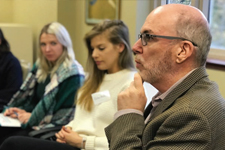


Western Law professor Thomas Telfer has set a precedent that has nothing to do with any courtroom decision. He’s the first person to lead a mindfulness ambassador council at a Canadian law school.
As Telfer led the entire first-year Law class in a brief meditation exercise – a teaser for the mindfulness council he would later offer to interested students – something stirred within Alejandro Gonzalez.
“The power in the silence of 170-plus classmates meditating emboldened me,” Gonzalez said. He was inspired by the conviction and honesty with which Telfer and Assistant Dean (Student Services) Mysty Clapton spoke about issues they’d faced. “I wanted to develop my mental-health strength and it seemed like a great tool to do just that.”
Telfer admitted to being a “bit skeptical” when he initially explored programs offered by Mindfulness Without Borders, a group that teaches the advantages of taking time to pause, to breathe, to be aware, to remain in the moment. It didn’t seem, at first, to have a direct connection with the study and practice of law. But he soon found a link.
“There are a lot of different teaching techniques I never used before in my classroom,” Telfer said. “I did not think law students would embrace the course. I did not think they would use the teaching techniques, the talking techniques used in the course. I wasn’t sure this was really going to work.”
But after proposing a fiveweek pilot project to the Dean and a brief two- to three-minute meditation session as an introduction to the students, Telfer gauged interest in the optional, non-credit course.
“I went back to my office and sent out the email inviting registration in the course. I really didn’t know how many people would respond, so I was quite concerned about the initial uptake,” he said. “Within 10 minutes I had three replies, and within the day the course filled.”
It became the first Mindfulness Ambassador Council (MAC) at a Canadian law school.
Said Gonzalez, “For me, MAC, and the lessons we learn, is about growing as human beings and interacting with the world around us. It’s powerful stuff.”
The intention of the group is to develop daily mindfulness practice to strengthen attention and overall wellbeing. Telfer is facilitator, allowing the students to lead the direction of each session.
“The students are ambassadors, and the idea is they would take what they’ve learned in the course and be ambassadors for mindfulness in the community, or for their classmates,” Telfer said.
Mindfulness practice is paying attention to the present moment, without judgment, without being distracted. It has direct relevance both to wellbeing and education.
“The course is about building social and emotional intelligence. Listening mindfully, resolving conflict, noticing emotional triggers and how to respond to those triggers,” he added.
“It’s very hard, in a busy society, to focus on the present. Our minds always run to what we have to do next, where we have to be, where we have to go, or thinking, with some regret, about yesterday and how ‘I could have done this, I should have done that.’ But how many people are actually focused right now, in the moment? It’s a practice you need to build.”
Student Madison Derraugh chose to be part of the MAC as an extension of her push for better personal health and fitness.
“This was largely influenced by my travels, when I went on an exchange in my undergrad and the people I met while away, but also my new dedication to the practice of yoga, beyond just the physical challenges,” said Derraugh.
For Derraugh the sessions revealed that, even under the pressure of law school, she’s not alone.
“It provided me with new techniques and support systems – meditations, exercises or people – I can use to help me navigate my way through law school, and beyond. It’s improved my ability to deal more skillfully with stress and anxiety.”
A pre- and post-survey questionnaire from the firstsemester offering of the course showed students had improved focus, concentration and feelings of well-being. That’s particularly important in law, where pressures can be intense, Telfer explained.
“Rates of depression and mental-health issues in the legal profession are higher than in the general population. This is a tool that is very helpful. And with the students’ arrival on campus, everything is new and this course is a way to help them ground themselves.”
The Personal Management Practice Guideline recently released by the Law Society of Ontario also highlights mental wellness and notes the advantages of mindfulness and mindfulness training.
Last spring, Telfer received a Teaching Fellowship to promote mental health and mindfulness and will study mental health education initiatives at other law schools and develop, in consultation with Western’s Law faculty, a new mental health education program.
In addition, Telfer will also conduct research on the impact of these mental health and mindfulness initiatives.
“Thanks to Professor Telfer’s leadership, Western Law is making substantial progress in improving student wellness,” Dean Chamberlain said. “I’m eager to see how his ongoing research will equip law students to manage the personal and professional stresses of legal practice, so that they can serve their clients and the public more effectively.”